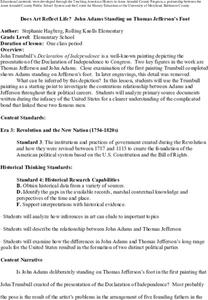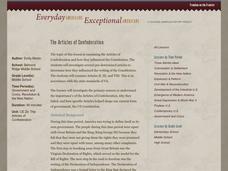PBS
Alexander Hamilton: Lawyer, Writer, and Founding Father
Scholars analyze the impact Alexander Hamilton had on the creation of the United States. Primary documents and video clips give learners a glimpse into the life of one of America's Founding Fathers, arming them with enough information to...
PBS
Benjamin Franklin: Writer, Inventor, and Founding Father
Imagine being a writer, inventor, businessman, and the founding father of an entire nation! Pupils analyze the life and activities of Benjamin Franklin. Primary documents, videos, and paintings open up the world of Franklin to young...
Core Knowledge Foundation
A New Nation American Independence Tell It Again!™ Read-Aloud Anthology
Sixteen lessons make up a read-aloud anthology centered around America's journey toward independence. Scholars hear texts about the Boston Tea Party, Betsy Ross, the Found Fathers, the Liberty Bell, and more! Pupils discuss their...
Ashbrook Center at Ashland University
Ratification of the Constitution
How difficult was it to get everyone to agree on the contents of the Constitution? Historians analyze the task of the Founding Fathers in creating the United States Constitution. They research a directory of video clips, primary sources,...
DocsTeach
Excerpts from the Declaration of Independence
What exactly did the Founding Fathers declare? Elementary historians delve into the Declaration of Independence in a fast-paced activity. The resource provides text experts and guided questions to help academics analyze the intent of the...
Center for History Education
Why is John Adams Standing on Thomas Jefferson's Foot?
Was it a bromance, or were they frenemies? Young historians use a controversial portrait and letters between Thomas Jefferson, John Adams, and others to evaluate the relationship between the two Founding Fathers. Examining the primary...
National Endowment for the Humanities
The "To Do List" of the Continental Congress
What is on your to-do list today? The second lesson of a three-part series on Lost Heroes of America investigates the laundry list of items in front of the second Continental Congress. Scholars research, analyze, and present information...
National Endowment for the Humanities
Lost Hero: Was John Hanson Actually the First President?
The first president of the United States was ... John Hanson? Scholars investigate the notion that the initial leader of the nation was not George Washington. Using research, articles, and open discussion, individuals create a quest for...
National Endowment for the Humanities
The Road to the Constitutional Convention
After defeating the most powerful nation in the world, the United States had to deal with its own weaknesses in the Articles of Confederation. Activities in the lesson include analyzing primary sources from the Founding Fathers to...
DocsTeach
To Sign or Not to Sign
To sign or not to sign, that is the question. Scholars review the Declaration of Independence and discuss the Framers' decisions for signing the document. The activity uses primary text, a worksheet, and group discussion to help...
US National Archives
Benjamin Franklin: Politician and Diplomat
A scientist, inventor, entrepreneur, politician, and the founder of a nation—and that's just one person! Learners investigate the many lives of Benjamin Franklin. Using a hands-on interactive online resource, they analyze primary...
Reporters Without Borders
2017 World Press Freedom Index
Freedom of the press was seen as a right so important that the Founding Fathers listed it as part of the first amendment to the United States Constitution. Americans pride themselves on this freedom, but just how free are American...
National Endowment for the Humanities
Lesson 4 James Madison: Internal Improvements Balancing Act—Federal/State and Executive/Legislative
Who has the power? The founding fathers asked the same question when the United States was formed. Learners explore issues that arose during Madison’s presidency that raised constitutional questions. Through discovery, discussion, and...
Curated OER
What is Meant by Returning to Fundamental Principles?
What did the Founding Fathers mean by the importance of continually returning to fundamental principles? Your young historians will analyze a series of quotations illustrating the fundamental ideals and principles of the United States...
Ashbrook Center at Ashland University
The Constitutional Convention
Imagine sitting down with representatives of your school to write a new student handbook. What arguments would ensue? How would compromises be made to finish the project? Scholars research the Constitutional Convention using a directory...
Judicial Branch of California
Protecting our Freedoms: The Bill of Rights
Take to the stage! Integrate both drama and civic skills by asking pupils to create and perform skills that demonstrate the importance of the amendments in the Bill of Rights. After reviewing the Preamble to the Constitution, learners...
PBS
Amid Rising Economic Inequality, Does America Need a Third Reconstruction?
Young political scientists investigate the Poor People's Campaign protest held in Washington, D.C., on June 18, 2022. They research how the event was reported in various news outlets and consider their stance on whether "poverty is...
Roy Rosenzweig Center for History and New Media
The Articles of Confederation
Have you ever started a project only to realize you need to scrap it and start over? Scholars analyze the issues leading to the fall of the Articles of Confederation. A group investigation into Articles II, III, and VIII unveil the...
Gerald R. Ford Presidential Library & Museum
Benjamin Franklin: In Search of a Better World
Of the many roles he played, Benjamin Franklin most wanted to be remembered as B. Franklin, Printer. Learners of all ages find out more about this amazing man through the activities included in the Benjamin Franklin Tercentenary Guide.
PBS
Thomas Paine: Writer and Revolutionary
Is the pen really mightier than the sword? Scholars analyze the impact Thomas Paine's book Common Sense had on the American Revolution. Video clips and primary sources investigate the role Paine had on dissent in the colonies. They...
A&E Television
Thomas Jefferson: Teachers Guides
Thomas Jefferson remains one of the most fascinating figure in American history, both for his innovative contributions to the United States government and his remarkably contradictory personal life. A series of discussion questions and...
Northeast Georgia Regional Educational Service Agency
The American Revolution
An empowering lesson explores the causes and complaints that led to the American Revolution. Young scholars, starting in fourth grade, complete hands-on activities, role play, and create cartoons to understand the American Revolution and...
US Department of Commerce
Apportionment: Grades 3-4
Apportionment is a big word for young pupils. Use a helpful cartoon video and worksheet with data set to help them understand how the census fuels representative democracy. After examining how the census determines the number of seats a...
Constitutional Rights Foundation
The Troubled Elections of 1796 and 1800
Congress does more than create new laws. Political scientists delve into the elections of 1796 and 1800 to understand how political parties, the Electoral College, and personal agendas affected the election process. The resource also...
Other popular searches
- Our Founding Fathers
- Founding Fathers Game
- The Founding Fathers
- Bible and Founding Fathers
- Founding Fathers Project
- Founding Fathers Debate
- Founding Fathers Art
- Founding Fathers Fame
- Founding Fathers Gfame
- Founding Fathers Ideals
- Founding Fathers of Us

























